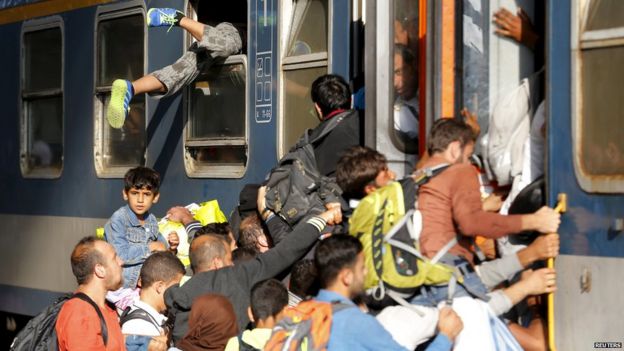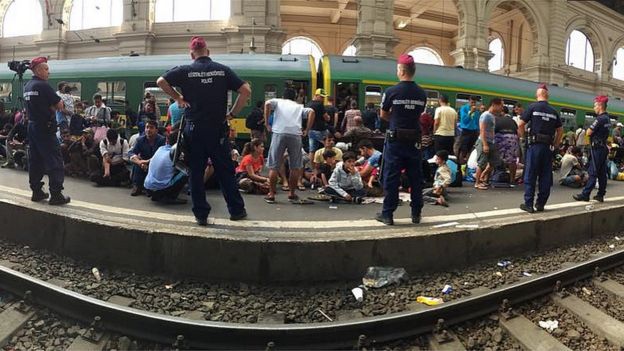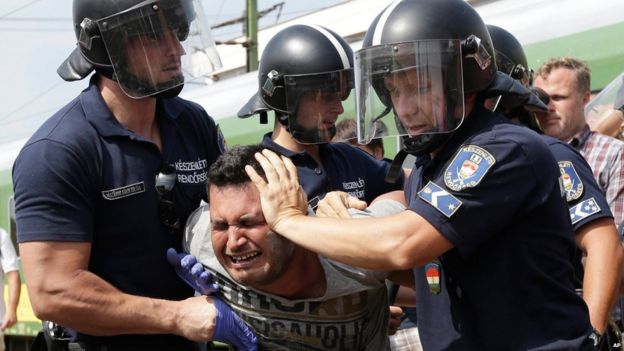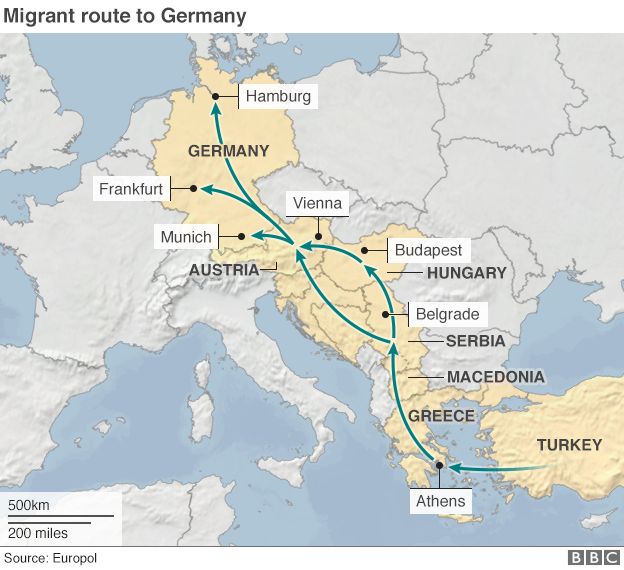Scuffles have broken out west of the Hungarian capital, Budapest, after police tried to force migrants off a train at a refugee camp.
Amid chaotic scenes, police ordered journalists from the scene at Bicske, declaring it an “operation zone”.
The train had left Budapest hours after police let migrants into the railway station following a two-day stand-off.
Meanwhile, there have been sharp disagreements among European leaders over how to deal with the crisis.
In Brussels, Hungary’s Prime Minister Viktor Orban described the situation as a “German problem” as Germany was where those arriving in the EU “would like to go”.
But European Council President Donald Tusk said at least 100,000 refugees should be distributed across EU states.
In other developments on Thursday:
- France and Germany repeated calls for a permanent and mandatory system to accept asylum seekers into the EU
- Czech police said they would stop writing numbers on migrants’ hands after criticism from human rights groups
- Bayern Munich football club said it would set up a training camp for refugees coming into Germany
Earlier on Thursday, migrants who had been camped outside Budapest’s Keleti railway station surged on to the platforms as soon as police withdrew.

Migrants tried to cram into carriages at Budapest, but international trains were suspended

Police had allowed people back into Keleti station after a stand-off

Police detained some of those on board and ordered journalists out of the area
The BBC’s Gavin Hewitt on board the train at Bicske
Nothing illustrates how difficult this crisis is to resolve than what has happened to these several hundred refugees who are currently on this train at Bicske. They jumped on the train after waiting at Budapest station for three hours. They were tightly crammed in – women and babies. They were told no international trains would leave. but eventually they were told this train would leave and they believed and hoped it would take them close enough to the Austrian border to get across.
There were some police on board. We got as far as Bicske and when the train pulled in, there were loads of police waiting for them on the platform. The plan seemed to be to remove them, to take them to a centre where they would be properly identified. Some people left the first carriage, but almost immediately there was resistance, a lot of people were banging on the windows, some were shouting “Germany! Germany!” The police put on riot gear.
And then there was one really distressing scene involving a woman who was carrying a baby by the railway tracks shouting “help! help!” There was a struggle involving one of her companions and riot police. This incensed some of the other refugees who had been taken off the train, they began pushing and jostling and there was a little bit of fighting with the riot police. And then they forced their way back on the train, which is where we are at the moment with police on the platform with several hundred refugees on the train in sweltering conditions.
International services were suspended at Budapest’s station but hundreds crammed on to the first train hoping it would take them to the Austrian border.
Instead, the train stopped at the Hungarian town of Bicske about 40km (25 miles) west of Budapest which hosts a major refugee camp, and police lined the platforms.
Some migrants at first left the train but then forced their way back on when they realised where the authorities wanted them to go.
They fear that registering at the camp will make it harder for them to seek asylum in Germany and other countries.

The number of migrants entering Europe has reached record levels this year. Germany expects to take in 800,000 asylum seekers this year – four times last year’s total.
The surge in numbers has created tension and disagreement over EU migration policy. Germany has been prepared to accept large numbers of asylum seekers, but other countries have not.
During a tense press conference in Brussels with European Parliament President Martin Schulz, Mr Orban, who heads the anti-immigration Fidesz party, said Hungarians “were full of fear because they see that the European leaders… are not able to control the situation”.
“Nobody would like to stay in Hungary, neither in Slovakia nor Poland nor Estonia. All of them would like to go to Germany. Our job is only to register them,” he said.
Mr Tusk took Mr Orban to task for saying in a newspaper interview that Hungary was being “overrun” with refugees who threatened to undermine Europe’s Christian roots.
“Referring to Christianity in a public debate on migration must mean in the first place the readiness to show solidarity and sacrifice,” he said.
Mr Tusk’s call for at least 100,000 asylum seekers to be redistributed across EU states is a sharp increase on a previous European Commission target of 40,000.
The human cost of the crisis was also put into sharp focus on Wednesday when five children were among 12 migrants who drowned in Turkish waters while trying to reach Greece.
Images of the washed-up body of three-year-old Aylan Kurdi, who died alongside his mother and five-year-old brother, circulated widely on social media.
UK Prime Minister David Cameron said that “as a father” he had felt “deeply moved” by the pictures and said that that Britain would fulfil its “moral responsibilities”.
Migrants or refugees?
The word migrant is defined in the Oxford English Dictionary as “one who moves, either temporarily or permanently, from one place, area, or country of residence to another”.
A refugee is, according to the 1951 Refugee Convention, any person who “owing to a well-founded fear” of persecution is outside their country of nationality and “unable” or “unwilling” to seek the protection of that country. To gain the status, one has to go through the legal process of claiming asylum.
The word migrant has traditionally been considered a neutral term, but some criticise the BBC and other media for using a word they say implies something voluntary, and should not be applied to people fleeing danger.
BBC
 Q FM Africa's Modern Radio
Q FM Africa's Modern Radio